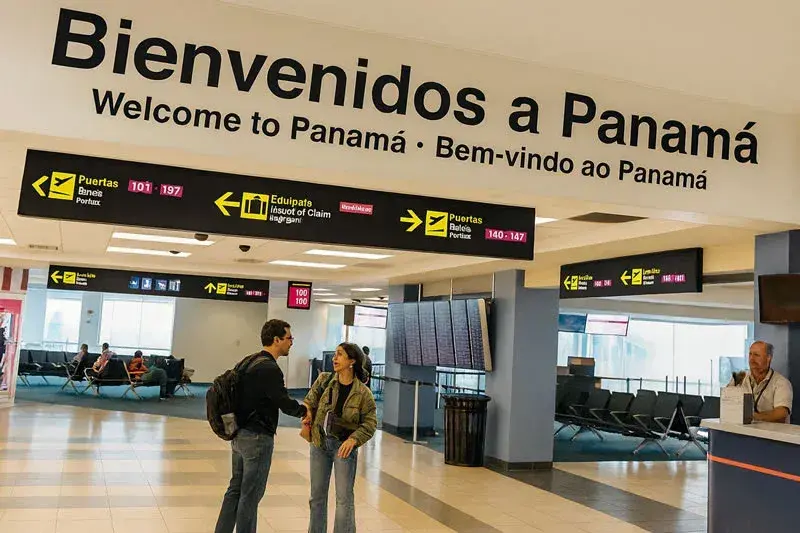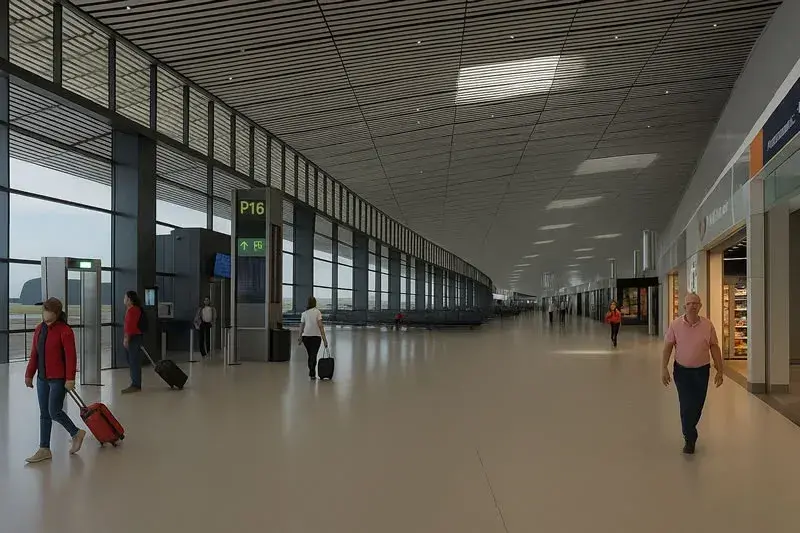If you want to visit the official website, click HERE
Guide to Terminals at Tocumen Airport
Tocumen International Airport (PTY), known as the "Hub of the Americas," is a crucial connection point on the continent, composed of two main terminals: the historic Terminal 1 (T1) and the modern Terminal 2 (T2). Both are interconnected and offer a wide range of services, but the passenger experience can vary notably between them. This guide, enriched with the analysis of hundreds of traveler experiences, will help you navigate its facilities like an expert, knowing its strengths and areas for improvement.
Frequently Asked Questions about the Terminals
Can you walk between Terminals 1 and 2?
Yes, it is possible to walk between both terminals through an indoor corridor, but be prepared for a long walk. Users report that the walk can take between 15 and 25 minutes, a considerable distance if you are carrying hand luggage or have a short connection.
Can I take the water I bought inside the airport on the plane?
Generally not. One of the most recurrent complaints is the double security check, especially for flights to the United States. After passing the main security filter, you will have to go through a second check directly at the boarding gate, where you will be required to dispose of any liquids, including the water you just bought in the terminal stores.
Is it easy to find a place to charge my electronic devices?
No, it's a challenge. The lack of functional outlets and charging stations is a constant criticism. Many users point out that the few available stations are often occupied or out of service, so it is recommended that you carry a fully charged external battery (power bank).
How does the WiFi at Tocumen Airport work?
The airport offers a free WiFi connection, but it is limited to one hour. Once that time is up, you will have to pay to stay connected, with rates that users consider high. This policy is a point of frustration for those with long layovers.

AI-generated image
Smart Traveler's Handbook: Critical Points to Consider
- The Double Security Check: Be aware that for many international flights, especially to the U.S., there is a second security check at the boarding gate. Avoid buying drinks after the first check, as you will be forced to dispose of them.
- Connectivity and Power: Do not count on easily finding an available outlet. The scarcity of functional charging points is a frequently reported problem. A portable battery is your best ally.
- Distances and Connection Times: The airport is very extensive. Moving between gates, especially if you change terminals, can take longer than expected. Add an extra margin to your calculations to avoid rushing.
- Hydration: Several travelers have noted that the water fountains are often out of service. This, coupled with the rule of not being able to board with liquids, forces you to buy water at high prices inside the gate waiting area, if available.
- High Costs: From a coffee to a full meal, the prices for food, drinks, and in stores are consistently rated as very high by users. Consider this in your travel budget.
Connection Between Terminals
Tocumen International Airport (PTY) offers a free and efficient shuttle bus that connects Terminals 1 and 2. Operating daily from 5:00 am to 11:00 pm, this external service allows for a quick transfer (8-10 minutes) between terminals for passengers in transit, arrivals, or departures. Equipped for accessibility and luggage transport, it significantly reduces travel time, ensuring a more comfortable travel experience. More information on connection between terminals.
User Experience:
Although there is the option to walk, passengers warn that it is a long journey, between 15 and 25 minutes, which can be exhausting. In addition to the external shuttle, there is an internal bus that operates on the tarmac (from 5:00 am to 9:00 pm), but information about its stops and frequency can be confusing. The lack of sufficient functioning moving walkways is a common complaint that further complicates walking the long distances of the airport.
Below is an overview of each terminal, including its composition, services, connections, and types of flights they handle, as well as a description of the user experience in both terminals.
Terminal 1 (T1)
Inaugurated in 1978, Terminal 1 has been the main gateway to the country for decades. It has 34 boarding gates and 6 remote positions, facilitating the processing of an average of 25,000 passengers daily.
Levels and distribution:
- Level 100: Arrivals area, immigration and customs services, baggage claim, and access to ground transportation.
- Level 200: Departures area, check-in counters, security control, and access to boarding gates.
- Level 300: Restaurants and information center.
Airlines operating in T1:
- Aerolíneas Estelar
- Aeroméxico
- Air Europa
- American Airlines
- Avianca
- Boliviana de Aviación
- Cayman Airways
- Copa Airlines (some flights)
- Delta Air Lines
- Iberia
- KLM (counters may be here, although it operates in T2)
- Sunrise Airways
- Turkish Airlines
Services and facilities:
- Dining: Variety of restaurants, cafes, and fast-food outlets.
- Shopping: Duty-free shops, fashion boutiques, electronics, and souvenirs.
- Connectivity: Free Wi-Fi for 60 minutes throughout the terminal.
- VIP Lounges: Includes the Copa Club and The Lounge Panama, although some users have noted that the food options are limited and the facilities can feel outdated or lack maintenance.
- Other services: Currency exchange, ATMs, banking services, medical clinic, and assistance for passengers with reduced mobility.
User Experience:
Travelers perceive Terminal 1 as the older and, in some areas, outdated section of the airport. Recurring criticisms point to poor cleanliness in restrooms and waiting areas, with stained seats and neglected floors. The lack of maintenance is evident in details like non-functioning soap dispensers or an infrastructure that shows its age. Some passengers report that the gates at the ends of the terminal feel particularly neglected and that the overall experience can be inconsistent depending on the area you are in.
Terminal 2 (T2)
Inaugurated in 2019, Terminal 2 is a modern expansion designed to increase capacity and improve the passenger experience. With an approximate area of 116,000 m², it has 20 new boarding gates and 8 remote positions, allowing it to serve more than 21 million passengers between both terminals.

AI-generated image
Levels and distribution:
- Level 100: Arrivals area, immigration and customs services, baggage claim, and access to ground transportation. Car rental offices are also located here.
- Level 200: Departures area, check-in counters, security control, and access to boarding gates.
- Level 300: Restaurants.
Airlines operating in T2:
- Air France
- Copa Airlines (main operation)
- KLM
- United Airlines
Services and facilities:
- Dining: Wide range of restaurants and cafes, including fast-food and gourmet options.
- Shopping: Fashion, jewelry, electronics, crafts, and duty-free stores.
- Connectivity: Free Wi-Fi limited to one hour available throughout the terminal.
- VIP Lounges: Houses the new and spacious Copa Club, praised for its design and comfort, but strongly criticized for its scarce and repetitive food offer.
- Other services: Parking with more than 1,200 spaces, efficient LED lighting systems, and state-of-the-art technology for passenger and baggage security control.
User Experience:
Terminal 2 is universally recognized for its modern design, spaciousness, and cleanliness, offering a "first-world" atmosphere. However, its functionality is a point of debate. Passengers often describe it as a "shopping mall" with gates very distant from each other, forcing long walks. The harshest criticism focuses on the lack of operational moving walkways, which turns transfers into an athletic challenge. Although the architecture is impressive, many feel that passenger comfort and convenience were not the top priority in its design.
